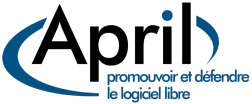Objet : Liste de discussion pour le groupe de travail traductions (liste à inscription publique)
Archives de la liste
- From: Marc Chauvet <marc.chauvet AT gmail.com>
- To: traductions AT april.org
- Subject: Envie de relire ? 3 relectures qui n'attendent que vous !
- Date: Sun, 22 Feb 2009 23:33:11 +0100
- Domainkey-signature: a=rsa-sha1; c=nofws; d=gmail.com; s=gamma; h=mime-version:date:message-id:subject:from:to:content-type; b=qpQZEvuKAfG2AsBoLzRy0GPSoorqeqbUXOIFBigHrZSz5Ks50yXdtEZjP/f6J4Dgmk fddCYzCe0uA4toA7h1kiunr82wG6Fu89fJFeW6pE61HDOoc2ZO4gTvxQPvkDPWJ+/lED r0NpT3M2DbhYEHQbB3sF9HY1fgHF7YHOTr0To=
Bonsoir à tous,
Avis à ceux qui souhaiteraient, il y a différents documents plus ou moins longs (1/3p, 2p et 13p) en attente de relecture (traduction EN->FR) :
- Document 1/3 p
version à relire : http://www.april.org/en/what-free-software
version source : http://www.april.org/fr/articles/intro/ll.html
cette relecture peut nécessiter de vérifier/modifier vos droits sur le site, mais c'est rapide et sans douleur ;)
- Document 2p :
version à relire : fichier html ci-joint
version source : http://www.april.org/articles/intro/ll.html
- Document 13p :
version à relire : fichier odt ci-joint.
version source : http://www.april.org/files/documents/rapport-moral-2007-synthetique.pdf
Bonne soirée à tous
Marc
Attachment:
rapport-moral-2007-synthetique.en.odt
Description: application/vnd.oasis.opendocument.text
- Envie de relire ? 3 relectures qui n'attendent que vous !, Marc Chauvet, 22/02/2009
Archives gérées par MHonArc 2.6.16.
